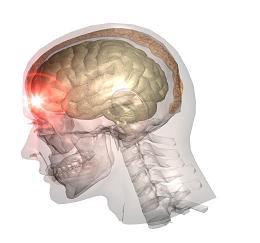 March 21st is National Brain Injury Awareness Day sponsored by BIAA (Brain Injury Association of America) on Capitol Hill in Washington, D.C. With over 200,000 troops suffering traumatic brain injuries (TBIs) in the recent wars in Iraq and Afghanistan, it is no wonder that TBI is a “hot topic” in healthcare circles. The drastic rise in combat related TBIs has raised awareness about other forms of brain injury, such as those from strokes or sports related concussions. Annually about 1.7 million Americans alone suffer a TBI. The sheer magnitude of those affected has spurred significant research and development in diagnostics and treatment of TBIs in both the military and civilian sectors.
March 21st is National Brain Injury Awareness Day sponsored by BIAA (Brain Injury Association of America) on Capitol Hill in Washington, D.C. With over 200,000 troops suffering traumatic brain injuries (TBIs) in the recent wars in Iraq and Afghanistan, it is no wonder that TBI is a “hot topic” in healthcare circles. The drastic rise in combat related TBIs has raised awareness about other forms of brain injury, such as those from strokes or sports related concussions. Annually about 1.7 million Americans alone suffer a TBI. The sheer magnitude of those affected has spurred significant research and development in diagnostics and treatment of TBIs in both the military and civilian sectors.
Damage from a brain injury, and its aftermath if any, have been difficult to pinpoint using available diagnostic scans, in turn handicapping short and long-term treatment. Physicians and their teams have relied on tools, such as the 3 Tesla MRI and Diffusion Tensor Imaging, to reveal breaks in neural connections. While improvements, these are still not definitive or comprehensive methods of locating and viewing the damage, much as an X-ray reveals most but not all fractures to the skeletal system. However, a team at the University of Pittsburgh is developing a more promising scan based on high-definition fiber tracking. It produces a higher resolution imaging of the actual nerve fibers and tracts of the entire neural system. According to a March 2nd article by API’s Lauren Neergaard, which appears in “AirForceTimes”, this new way of scanning “lights up” deeply embedded breaks in the brain, enabling the medical team to devise a much more effective course of treatment and rehabilitation for their patients.
Other advances in TBI diagnosis show similar promise. The military is experimenting with an advanced CT scan that could diagnose TBI based on changes in blood flow inside the brain. This has strong potential for application in the case of strokes and seizures as it isn’t impacted by swelling to the brain. In addition, NIH is studying biomarkers that enter the bloodstream following a TBI, which may lead to formulation of a simple blood test to detect TBI damage in its earliest stages. This less invasive test has immediate and practical implications particularly for sports-related TBIs. Given on the sidelines or in the locker room, this test could prevent further damage to the athlete by confirming or denying their participation in a game following their initial injury.
Although great strides continue to be made in the field, these advances are not yet available to the general public. Instead diagnosis and recovery for TBI patients continues to depend heavily on intervention therapies and an effective medical treatment team. OTs, PTs and SLPs are integral and essential components of that team both during and post- hospitalization or surgery. As educational, diagnostic and treatment tools for your TBI patients, we recommend the following apps:
- Communication Apps by Apps for All: This $.99 download is a curated list of apps designed to assist with and augment the treatment of communication disorders in children and adults.
- FINR Brain Atlas: Florida Institute for Neurologic Rehabilitation is the developer of this $1.99 interactive three-dimensional app of the brain’s anatomy. The 9 most common brain injuries and 29 anatomical regions of the brain can be selected in any combination by tapping; viewing angles can be rotated or changed by touching; and text boxes display normal functions along with post trauma consequences.
- Comprehension TherAppy: Part of a series of apps from Tactus Therapy Solutions which include Writing TherAppy and Naming TherAppy, this is a multi-lingual tool for $24.99. It has three modules of Listen, Read and Listen&Read targeting individualized goals. Difficulty levels automatically adjust based on performance. Results can be emailed to decrease documentation time.
If you would like to become part of this trending specialty, or to explore other new and exciting career development opportunities call Centra at 800 535 0076 and let one of our outstanding team members help you to reach your goal.